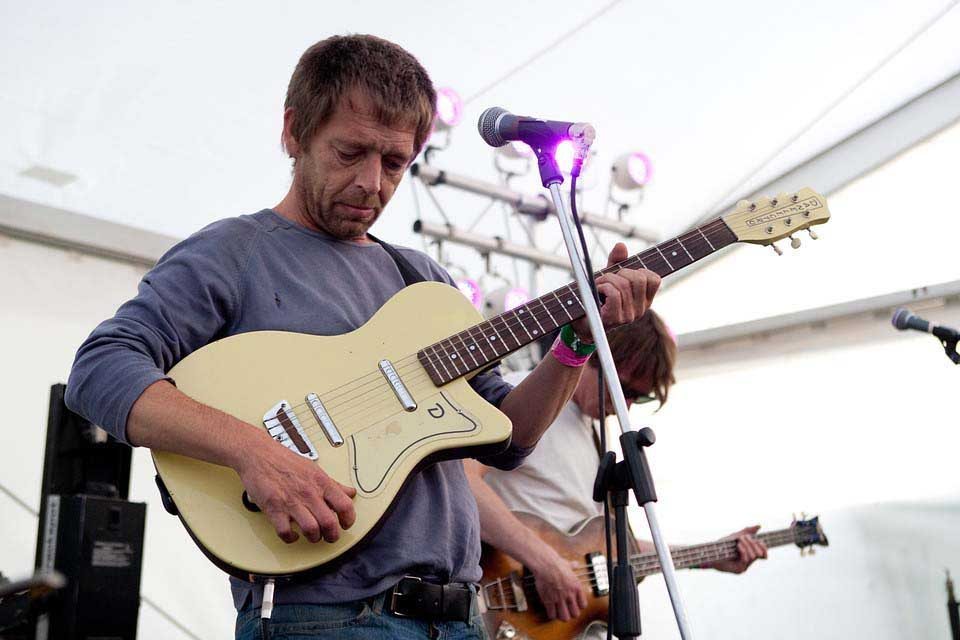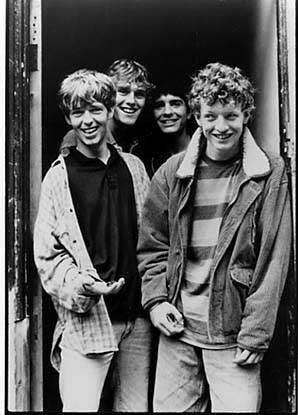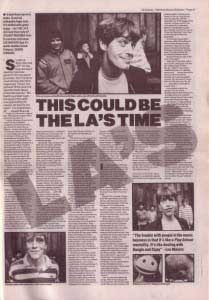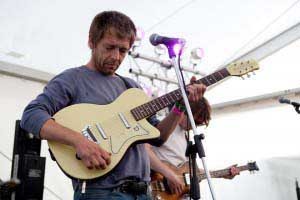GENIUS. Just a word on a page. Yet it somehow seems symbolic for a man who did just that; wrote words on a page.
Tortured. Shambolic. Obsessed. Reclusive. Melancholic. Disappointing.
These are other words on my page. All of them and many more besides can be used to describe the life and times of Lee Mavers.
Yet when it all comes down to it, when you wash away the self doubt, the fear, and that 1960’s dust, you find yourself right back where you started. Back at that word.
Genius.
Right from his youth Lee Mavers wanted to be a musician. And to play for Everton. One of his dreams came true, at least for a little while. Then the dream died.
He killed it. He did. Hid it away inside where no-one else could see it, tore it limb from limb. Only occasionally would he let people in, people he trusted and allow them to see the dream.
And when they did, even for the briefest split second, it made them warm and it made them mad. Warm because he still had it. Mad because he was intent on losing it.
An early review in the Chicago Tribune described Mavers thus:
“He mixes Billy Bragg style punk folk, early Fleetwood Mac style blues, skiffle, dance hall ditties and Merseybeat guitar jangle without strain or contrivance. His terse lyrics convey the restlessness and cynicism of English youth but the rapture of his melodies provides the way out”.
And what a way out. While the rest of Britain was caught up in a recycled house music melodrama called Madchester, Mavers was three steps ahead, following his heart and pouring his soul into an album full of restless classics.
And yet already it was the beginning of the end.
The La’s were formed around 1984 by early member Mike Badger.
Although band members came and went, the constant forces from 1986 onwards were Mavers and bassist John Power.
Together they started playing and recording demos which became the talk of Merseyside; stripped down, raw sessions that were recorded on anything the band could get their hands on, some of which surfaced on Lost La’s 1984-1986: Breakloose in the late 1990’s, some of which remains unheard by a wider market and some which made up their eponymous debut album, three years in the making and consumed with problems ranging from the wrong producers of which there were at least seven, to Mavers’ ever-increasing obsession with perfection.
At one stage they announced that Pete Townsend would produce their work. It, like so much else with The La’s, never came to fruition.
When the album finally did hit the shops, its raw beauty, it’s simplicity and its uncomplicated nature masked a thousand cuts.
It was the anti-Madchester digest; classic pop. Leery, cheery and full of moments of genius.
It possessed the sort of verisimilitude that only a few can ever provide.
“The Beatles meets The Smiths with sharp, incisive lyrics” was how one reviewer described it. An American paper would later describe ‘There She Goes’ as ‘better than the whole of Britpop combined’. Bummed it wasn’t.
Unvarnished guitar pop it unashamedly was and at the end of a decade full of large shoulder-padded over-production, it was musical manna from heaven.
And yet whilst the critics acclaimed it as the finest work of the year, the band turned on it, Mavers especially. He left no stone unturned in his hatred for the album, but his passionate plea against their 36 minutes of delight was merely an attack on the perceived ills being done to the band by the record company.
Even so, when they say all publicity is good publicity, I’m not sure whether ‘all’ quite meant this:
“I don’t like the record at all. I can’t listen to one song on it. We got signed up on the strength of demos we did in August 1986 which cost us £15 to do in a day and it’s our best recorded work to date. We hate the album. It never captured anything that we were about.”
But despite his disgust, Mavers always knew musically where his roots lay; he was open about those who had influenced his work and what he wanted it to be; working-class passion, a cocktail of aphoristic refrains that provided snapshots of those for whom he’d taken inspiration.
“Chuck Berry, Bo Diddly, James Brown, Captain Beefheart, early Who, Bob Marley, Louis Jordan, Duke Ellington, Ella’s voice. That’s the backbone, the real soulful stuff that you can learn from and grow with. There’s a thing that ties them all together, a raw, rich rrrrrrrrr! A growl. A feel that can’t be bought.”
It wasn’t a new sound. In fact as he said himself it was ‘genuinely ancient’. Yet what’s right has always been right.
The lyrics spoke of a man, of a city, of a culture in pain, regardless of the upbeat melodies that accompanied them. The remarkable ‘Son of a Gun’ is a prophecy on what was to come;
“About a man who’s at loggerheads with his past all the time. He’s alive and living in purgatory.
There was once a boy of life who lived upon a knife.
He was burned by the twentieth century. Now he’s doing time in the back of his mind.”
Almost as quickly as they’d announced themselves to the nation, someone gave Mavers a hammer to shatter the dream. He was feeling the burn of the twentieth century as strongly as anyone in the music industry, more perhaps.
He talked of how the music was removed from his work because of the record company, how the raw, organic nature of the early days had been ruined by being filtered through digital technology.
The obsession with perfection is vivid in any creative. With Mavers it swung close to Howard Hughes territory.
His years spent on the dole and making do with the instruments on hand, of the council- funded studios, the kitchens and the impromptu sessions recorded onto dictaphones to somehow retain the clarity and purity of the sound meant he felt uncomfortable with what the business offered him. There is the story, probably apocryphal, that he rejected a vintage mixing desk because it didn’t have the original 60s dust on it.
True or not, those around The La’s wouldn’t have struggled to believe it if Mavers really had said it. For him it was it was either old school or no school. For the others it simply became tiresome.
As creation became frustration and soft drugs turned harder, what could have been something truly special just became a footnote in history.
The La’s ground to a halt in 1992 and Power went off to form Cast.
Mavers promptly disappeared from the band, from the scene and from view altogether.
He’d once said that the power of The La’s wasn’t about him ‘being a face’ but that they were there to pass on ‘a feeling’.
Art imitated life for the troubled front man and the ‘feeling’ moved away from music to something and somewhere altogether darker.
Rumours of alcoholism and heroin abuse reigned. There she blows again, pulsing through my veins.
Art.
Imitating life.
We’ll probably never know the real reasons why Mavers did what he did, why he walked. He probably doesn’t know himself. The myriad of issues hidden in the spaghetti junction of his mind is far too complex to ever see the light of day.
Suffice to say that his writing is proof enough of the internal battle he seemingly faced every day. Even Power, his closest musical collaborator seemed confused:
“I don’t know. Truth is, I don’t wanna know. Drugs and madness go hand in hand. People who you’ve known all your life…..they’re steady, then they’re not. But you can’t ponder, cos it kills you, la.”
So what happened next? No-one quite knows. Journalists would seek him out for ‘the exclusive’ but no-one saw the real Lee Mavers.
If he answered the door then most came away with the sense of a man trapped inside his own madness. And yet, and yet, the creative gene was still burning brightly.
Fuelled by heroin or booze or pain or the remnants of the genius that wouldn’t die, he continued to write. The material he worked on became even more talked about than the original underground sessions. Those people from the inner circle who got to hear it talked in hushed tones about the magnificence of it all. Yet he refused to commercially record or release it.
There would be the occasional sightings of the man of course. It was claimed he’d written ‘Changing Man’ for Paul Weller, then played in support of the former Style Council front man only for the plugs to be pulled as chaos reigned on stage.
He told the NME that his music sounded like a “Nazi tank in Egypt” and referred to “the pool” as being where it was at; “the Liver-pool, The Mississippi, the Mersey-sippi”.
He was out there. Somewhere. Then, five years after The La’s one and only album came out they reappeared on stage at Hull’s Adelphi.
It was a shambolic, rambling experience. An injustice to all that had gone before musically. Those who witnessed it said that Mavers played ‘There She Goes’ three times without realising what he’d done, still in the clutches of one demon or another.
However, whilst he may have lost the thread at that point, in the audience that night were members of a band for whom Lee and The La’s were vitally important to the footprint they were about to stamp all over British music, who remembered the great times and just how good this Merseyside band could be.
Around the same time that The La’s reached the brink and split, a group of similarly minded Mancunians were starting a band they tentatively called The Rain.
That soon became Oasis when Liam and latterly Noel Gallagher joined. History will record that The Beatles were the inspiration for the brothers, but it’s not to be underestimated the effect that The La’s had on what became of Oasis.
Liam used to dream of Lee, the two of them riding into the distance on horseback, clutching golden candlesticks whilst Noel stated that Oasis’s goal was to finish what Mavers and The La’s had started.
But Lee himself wasn’t ready to give up the ghost, regardless of the new pretenders. He wanted to be the one to finish what he’d started and if he could do it in the comfort of his own home where no-one else could see then all the better.
So what becomes of a man who can’t match his own inspirations?
“After saying it’s got to be better than The Who, The Beatles or Bob Marley, he must have scared himself with that” opined Edgar Jones who played bass with The La’s in one of their latter day incarnations.
But for all the fear, it never stopped Mavers trying. His life became more complicated; he settled down and fathered four children. Yet the simple pleasures of life cheered him; “He’s a complete football head” said Matthew Macefield, one of the few outsiders who ever got close up to Mavers.
Macefield’s connection with the JD Salinger of pop is interesting. As epiphany’s go, his was fairly profound. As a 29-year-old solicitor he found himself in a record shop talking about The La’s when ‘There She Goes’ came on the radio.
As he told The Guardian back in 2003, “I don’t want to turn it into some mystical experience or anything, but that was the point where I thought, ‘I don’t want to ignore this any longer’”.
So Macefield began a near five -ear odyssey to track down the reclusive front man for a book. When the two meet, the musician cuts off Macefield’s opening gambit of admiration short: “I’m only a man, la. Just a person.”
What the young solicitor turned magical mystery tour passenger discovers is a mass of contradictions. As music journalist Alexis Petridis so succinctly put: “Mavers did not much resemble the drugged out idiot-savant of popular myth”.
There is no drug paraphernalia, no guitars or posters, no signs whatsoever of the tortured, shambolic recluse. Children are playing, the football results are on.
“Mavers is a warm, sensitive man who simply wants to follow his muse without compromise.” He tells Macefield he’s happy to talk and help with his tome: “Before I know it, he is talking, reminiscing about the time he wrote ‘There She Goes’”.
Hours fly by and Mavers talks excitedly about music. He riffs, he sings, he plays old recordings. He seems like a man possessed, with musical fire in his belly. He reveals he’s renting a place all kitted out for recording purposes and over time plays some of this magnificence that he’s been working on since it all fell apart.
He plays him ‘Raindance” and Macefield calls it “one of the best songs I’ve ever heard”. The signs of life are vital. They’re strong. Surely it can only be a matter of time until he’s back for good and the long hoped for second album comes along.
Then someone passes him the hammer again.
In a phone call significantly shorter than any of his songs on that lone album, Mavers decides the relationship is over: “I don’t want to even see a book on The La’s let alone read one”.
Radio silence is maintained. The muse doesn’t muse. He simply disappears again only to resurface in 2005 for a series of gigs. At Shepherds Bush the audience crackles with anticipation.
When Mavers steps from the shadows to the light it seems somehow prophetic. A female fan shouts ‘come on’ and there is a genuine buzz in the air. There is that rare feeling that you occasionally get at concerts, that you are on hand to witness something special, something epic.
Something created by genius.
Power is there to Mavers left and it’s poetic that they kick off with ‘Son Of A Gun’. For a couple of hours it’s like the past 14 years haven’t happened. “I’ll sell you a life story of a man who was at loggerheads with his past.” We’ve been here before. The concert descends into sing a long territory. The voice is still there. So is the legend.
So is the genius.
From there to now nothing much has changed. Rumours, occasional gigs, flashes of magic long since past. Round and round we go.
There was some work with Pete Doherty and Babyshambles. Their bassist Drew McConnell claimed he’d been recruited to work on that difficult second album, but again nothing clicked. Impromptu club gigs in London occurred, mainly just Mavers on an acoustic guitar with McConnell backing him on stand-up bass.
Then in early 2011 the rumours began yet again. Reforming. The album. A comeback. This time it would be different. In June Mavers appeared at the Manchester Deaf Institute under the name ‘Lee Rude and The Velcro Underpants’.
He played ‘Doledrum’, ‘Feelin’’ and ‘I Can’t Sleep’ as well as ‘Come In Come Out’ and ‘Clean Prophet’. Nothing new. But a start. Days later it was announced that the band would be reforming for a festival in France.
Meanwhile Mavers and a newly recruited bass player, Gary Murphy, formerly of The Bandits, have been appearing at small, seemingly unrelated venues around the country bashing out the old tunes. Selling out it isn’t. Moving on? Moving up? Who knows?
Most fans will only be truly satisfied if they hear from the arsenal of songs he’s written during his time away. No-one wants stadium rock and a half-hearted second stab. No-one imagines that’s what will happen.
In the end though, when Mavers finally takes to that festival stage, in that moment before the lights go up and that voice crackles with the youthful excitement of old, what will he be thinking?
Was it all really worth it, the endless drive for perfection in an imperfect business, the drugs, the fights, the decline and fall, the disappearing act? Will he wonder what might have been, about the unquantifiable magic that came from those early days of music making?
Or, as he steps to the microphone will there be a surge of contentment, that he really did do it his way, that he stuck to his beliefs no matter what the cost? And what beliefs.
Just as we’ll never know why he walked away I doubt we’ll discover why he came back and how he feels about it. But then in a way, that just adds to the mystery.
One constant has always remained in Lee Mavers life and that’s Everton Football Club. He once said that the rivalry between the blue and red half of Merseyside was vital, that no matter what the supporters felt, you couldn’t have one without the other.
Just as you can’t have music without The La’s. La.















Brilliant.
Great job Si, great article.
A good article, as a die hard, the “is his recent gigs selling out” they’ve been impromptu, with barely any notice, also, two of the four have been for free. I travelled 50 miles on the rumour of the whole “Lee Rude” pseudonym and the Manchester gig was sheer magic.
Lee has always done what he wants to do, and people should be happy for him to do what he wants, I wouldn’t love the La’s if Lee was leading the band onto Wembley Arena jumping up and down like Gary Barlow.
Lee told a fan at a gig that he may not play the festivals and if they do it’ll still be as a duo, no full line up. Lee is as real as anyone can be. He gives you what you need, not what you want.
Great article, lovely stuff. Sadly I ended up in the dressing room after the London gig recently…really can’t see this being anything more than another quick money earner. Also, the dude really needs to stop smoking hash… I think that’s where his problems lie.
Great article – and I never realised Dirk Kuyt was in The La’s (see the top pic)!
That was the most perfectly captured article I’ve ever read. Just fantastic.
Really great piece, Simon. And good spot on Dirk Kuyt. Also wouldn’t be surprised at all if Bernie Road’s point about hash isn’t a very good one. There comes a point when for someone whose mind’s been doing a lot of opening that the everydayness of hash is far from healthy.
Great writing, la! Travelled to England (for the first time) from Sweden just to see the man at Bestival 2011. Sheer magic it was!
The best piece I’ve ever read on The La’s…and I’ve read a lot of them! Any new news on Lee? I’ve been watching the Amsterdam 2011 gig onYouTube – he sounds amazing but looks haunted.